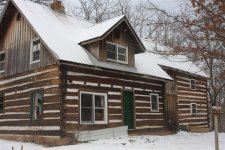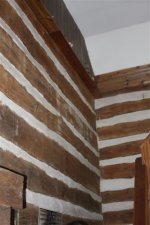OK, first off...where do you live? :laughing: Just the state,or at least the region! (NE,SE,SW,etc.) You don't have to give the exact location. I ask because construction costs/taxes/permitting vary IMMENSELY depending on your area. 5 to 10 acs. of land in rural NC as opposed to the same size lot in California or NY can be 10's of thousands of dollars difference. Same thing with permitting/regulations.
Knowing the general area would also help with climate considerations and construction. Heating/cooling a home in Southern Texas is a WHOLE different ballgame from heating/cooling a home in Northern Michigan.
Also, alternative construction methods sound great,(SIP, poured concrete,etc.) and do have advantages, but also tend to require specialized construction techniques. Poured concrete construction is not for a DIY'er unless you have friends who are engineers.

Check out Sam Walton's thread
http://www.tractorbynet.com/forums/projects/145915-terra-dome-earth-shelter-build-new-post.html to see whats involved with that. Very labor-intensive and costs can quickly escalate. SIP construction requires thorough planning beforehand as well as engineering considerations.
Believe me, I'm not trying to discourage you, but instead PREPARE you!

Whenever one deviates from "conventional" stick-built construction and moves towards "alternative" or "green" construction techniques/materials, labor and material costs can quickly escalate out of control. A small crew of good carpenters can frame/dry-in a simple,single story,1200 sq. ft stick-built house in less than a week with only hand tools and sweat. An electrician or plumber can rough-in that same home in 1 to 2 days.
When you get into poured concrete construction, forms must be made, conduit/plumbing installed, before concrete is even poured, and it has to be pumped into wall forms, requiring specialized equipment and experienced concrete guys. If not done properly, building integrity can be compromised.
Steel homes and SIP homes fall into the same scenario. Experienced contractors and usually a crane, along with engineering considerations and specialized construction techniques. Once again, not generally recommended for a DIY project with a limited budget.
Alternative, green construction sounds great when listening to the salesman's pitch (Reduced energy consumption, high r-values, living "off the grid", etc) but the higher construction/material costs are generally not re-couped until 5 to 10 years down the road.
Knowing the general location would help us out a lot in terms of recommendations. In my neck of the woods, if a building is not on a permanent foundation, a building permit is not required. My uncle and I framed a 15x30 shed on skids, vinyl siding,metal roof,plumbed/wired/insulated/sheetrocked it for less than $10,000,turn-key. We could have probably did it for 1/3rd less, but my uncle tends to "over-engineer" things! :laughing: My cousin lived in it for 4 years before he got married, then we converted it into a nice wood shop. Granted, it wasn't classified as a "residence"

and therefore was exempt from permitting/inspection, but it was still built to exceed residential code as far as construction. It was quite the bachelor pad while he lived there!
My point to all this is if you are working with limited funds and free or cheap labor/volunteers, then stay away from radical construction ideas. Keep it as simple as possible using readily available, inexpensive materials. If you have allergies, stick with wood/tile floors and use non-toxic,water-based paints or paneling for interior finishes. There are cellulose (recycled newsprint), cotton (shredded denim) and even agricultural-based (Soy) insulations that have comparable R-values to fiberglass and petroleum-based products and are much more allergy-friendly.
Since allergies are a concern for you, I would recommend
extreme caution with old/used trailers. I'd say over 90% of the mobile homes/campers I've seen that are over 5 years old have issues with mold from water penetration. Leaking roofs/windows, sub-par plumbing fixtures and cheap bathroom materials, lack of proper caulking around tubs,toilets,showers,and sinks are all problems I've encountered with mobile homes of all types and manufacturers. Even homes that appear well-cared for can have hidden issues, so
buyer beware!
Once again, I'm not trying to discourage you!!! I'm trying to PREPARE you!!:laughing: You have to be prepared and look beyond the shiny coating people put on things they are trying to sell,
especially when it comes to trailers and campers! That new tub enclosure may be hiding a rotting wall! That fresh coat of paint or new sheetrock may be covering water-damage and mold-covered studs. Whenever looking at these things, take along one of your construction-savvy friends in some old clothes. Have him crawl underneath that sucker with a bright flashlight and check for damaged,loose,or missing insulation. Open those cabinets, look under those sinks, bounce on those bathroom floors! The problems will show themselves if you look for them! Kilz paint can only hide so much!!

Don't give up! Don't give in! Use patience and thoughtful examination before buying! Your money is too scarce to throw away on something that isn't livable or will require a total redo!:thumbsup:
Good luck!!



